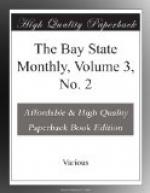Leaving Chicago he returned to New England, settling in Littleton, New Hampshire, in 1864; removing to Concord, New Hampshire, in 1879, where the closing years of his life were passed.
Mr. Marsh was married, first, April 4, 1844, to Charlotte D. Bates, daughter of James Bates of Munson, Massachusetts. The union was blessed with three children, of whom but one, Mary E. Marsh, survives. She resides in New York. Mrs. Marsh died August 20, 1852, at the age of thirty-six years. She was a woman of the finest mental qualities, highly educated, and very winning in her person and manners.
Mr. Marsh married, second, March 23, 1855, Cornelia H. Hoyt, daughter of Lumas T. Hoyt of St. Albans, Vermont. Three daughters of the five children born of this marriage live and reside with their mother in Concord, New Hampshire. Mr. Marsh died December 30, 1884, in Concord, and was buried in Blossom Hill Cemetery.
Mr. Marsh was to the very last years of his life a public-spirited citizen, entering heartily into any and every scheme which promised advantage to his fellow man. His native State was especially dear to him. He was very fond of his home and of his family. He was a devout Christian, and scrupulous in every business transaction not to mislead his friends by his own sanguine anticipations of success. His faith and energy were such that men yielded respect and confidence to his grandest projects; and capital was always forthcoming to perfect his ideas.
He had a wonderful memory for dates, events, and statistics, always maintaining his interest in current events. Aside from the daily newspapers, his favorite reading was history. The business, prosperity, and future of this country was an interesting theme of conversation with him. In business he not only possessed good judgment, wonderful energy, and enthusiasm, but caution.
He was philosophical in his desire to acquire wealth, knowing its power to further his plans, however comprehensive and far-reaching. Immense wealth was never his aim. He was unselfish, thinking ever of others. He had a strong sense of justice, and desired to do right—not to take advantage of another. He was generous and large in his ideas. He was benevolent, giving of his means in a quiet and unostentatious way. He took a great interest in young men, helping them in their struggles, with advice, encouragement, and pecuniary assistance. Students, teachers, helpless women, colored boys and girls, in early life slaves, came in for a share of his large-hearted bounty, as well as the Church with its many charities and missions.
Mr. Marsh was a consistent Christian gentleman, for many years identified with the Congregational denomination. He was a Free Mason; in politics he was an anti-slavery Whig, and later a Republican. In private life he was a kind, generous, and indulgent husband and father, considerate of those dependent on him, relieving them of every care and anxiety.




